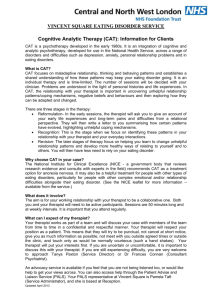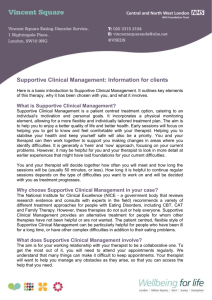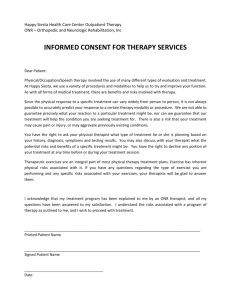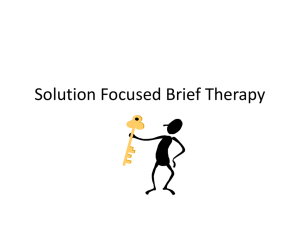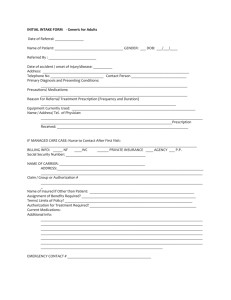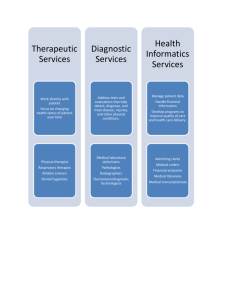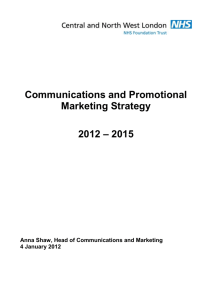Cognitive analytic therapy (CAT) - Central and North West London
advertisement
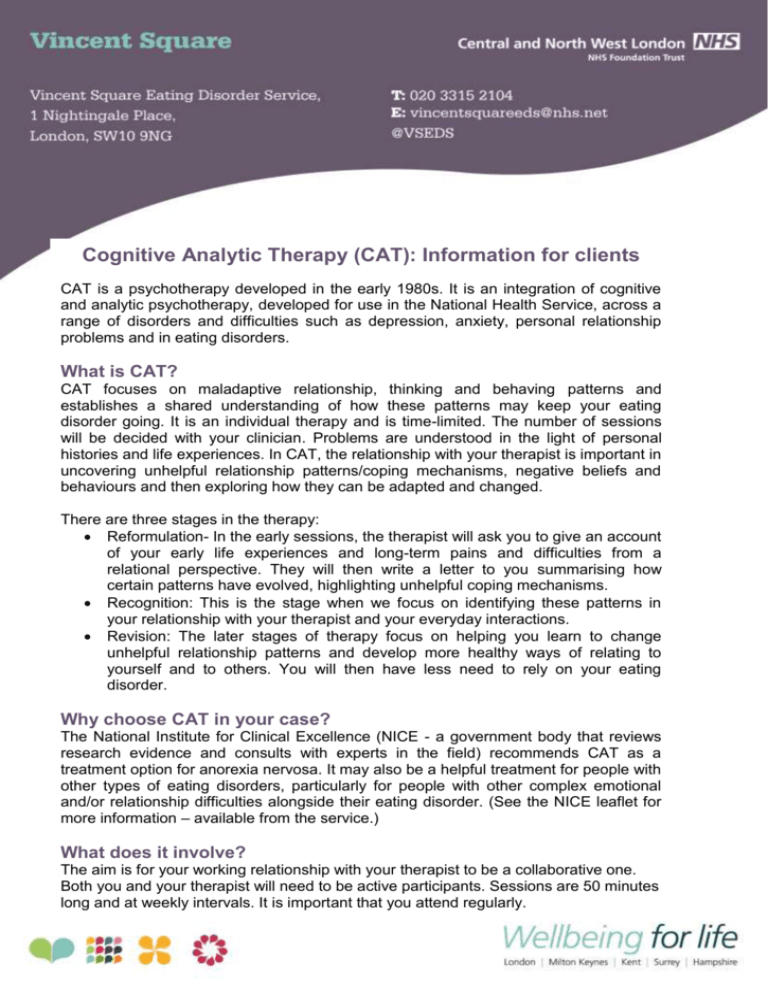
Cognitive Analytic Therapy (CAT): Information for clients CAT is a psychotherapy developed in the early 1980s. It is an integration of cognitive and analytic psychotherapy, developed for use in the National Health Service, across a range of disorders and difficulties such as depression, anxiety, personal relationship problems and in eating disorders. What is CAT? CAT focuses on maladaptive relationship, thinking and behaving patterns and establishes a shared understanding of how these patterns may keep your eating disorder going. It is an individual therapy and is time-limited. The number of sessions will be decided with your clinician. Problems are understood in the light of personal histories and life experiences. In CAT, the relationship with your therapist is important in uncovering unhelpful relationship patterns/coping mechanisms, negative beliefs and behaviours and then exploring how they can be adapted and changed. There are three stages in the therapy: Reformulation- In the early sessions, the therapist will ask you to give an account of your early life experiences and long-term pains and difficulties from a relational perspective. They will then write a letter to you summarising how certain patterns have evolved, highlighting unhelpful coping mechanisms. Recognition: This is the stage when we focus on identifying these patterns in your relationship with your therapist and your everyday interactions. Revision: The later stages of therapy focus on helping you learn to change unhelpful relationship patterns and develop more healthy ways of relating to yourself and to others. You will then have less need to rely on your eating disorder. Why choose CAT in your case? The National Institute for Clinical Excellence (NICE - a government body that reviews research evidence and consults with experts in the field) recommends CAT as a treatment option for anorexia nervosa. It may also be a helpful treatment for people with other types of eating disorders, particularly for people with other complex emotional and/or relationship difficulties alongside their eating disorder. (See the NICE leaflet for more information – available from the service.) What does it involve? The aim is for your working relationship with your therapist to be a collaborative one. Both you and your therapist will need to be active participants. Sessions are 50 minutes long and at weekly intervals. It is important that you attend regularly. What can I expect of my therapist? Your therapist works as part of a team and will discuss your case with members of the team from time to time in a confidential and respectful manner. Your therapist will respect your position as a patient. This means that they will try to be punctual, not cancel at short notice, give you as much information as possible, not meet with you outside agreed times or outside the clinic, and touch only as would be normally courteous (such a hand shakes). Your therapist will put your interests first. If you are uncertain or uncomfortable, it is important to discuss this with your therapist. If you are still experiencing difficulty, you are very welcome to approach Dr Frances Connan (Clinical Director). Comments, Complaints, Compliments We welcome your views on our service. Please contact the Patient Advice and Liaison Service (PALS) for confidential advice and information about CNWL services: • Phone: 020 3214 5773 • Email: pals.cnwl@nhs.net This document is also available in other languages, large print, Braille, and audio format upon request. Please email communications.cnwl@nhs.net Dokument ten jest na życzenie udostępniany także w innych wersjach językowych, w dużym druku, w alfabecie Braille'a lub w formacie audio. Mediante solicitação, este documento encontra-se também disponível noutras línguas, num formato de impressão maior, em Braille e em áudio. Dokumentigaan waxaa xitaa lagu heli karaa luqado kale, daabacad far waa-wayn, farta indhoolaha (Braille) iyo hab dhegaysi ah markii la soo codsado. Be belge istenirse, başka dillerde, iri harflerle, Braille ile (görme engelliler için) ve ses kasetinde de temin edilebilir. Central and North West London NHS Foundation Trust Stephenson House, 75 Hampstead Road, London NW1 2PL. www.cnwl.nhs.uk
